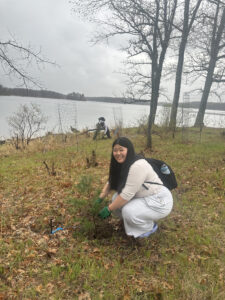
Thought Leadership: A few centuries ago, producing light was a difficult, costly, and time-consuming endeavor. For instance, to produce long-lasting candles, humans had to harvest spermatici oil from whales. Today, of course, producing light is incredibly inexpensive, and it has produced a great many benefits for society. It has also created the undesirable situation where an estimated 80 percent of the world can no longer see the spectacular beauty of the Universe due to light pollution. As I contemplate the coming advances in AI, I am of the opinion that, like light, AI will produce a myriad of benefits for humanity. It will also create unexpected problems. One possibility is that “knowledge” (or, at least, access to knowledge) becomes so cheap and easy to access that it may “pollute” human traits such as curiosity, imagination and even wisdom. The real-world implication of this issue is that both parents and educators must seriously consider at what age it is appropriate to allow children to have access to artificial intelligence.
Think and Then Think Again: As a futurist, you might think I would take comfort in this article, Why humans are still much better than AI at forecasting the future. Well, you would be right and wrong. I do believe that humans will remain better at forecasting certain things, including those areas where the power of the human spirit and the vagaries of human emotions play a prominent role. In those areas where raw data, verifiable information and statistical probabilities are most prominent, the days of humans’ forecasting skills (including my own) are limited.
Think Better: One way to improve your thinking skills (and your mental health) is to engage in the time-honored practice of stargazing. This article, The Best Places to Stargaze,” provides a list of the best places in the United States to take in the grandeur of the Universe. As a native Minnesotan, I would add that the list failed to include the Boundary Waters Canoe Area – which was designated an International Dark Sky Zone in 2020.
Think Long-Term: Last week, as part of teaching my course at the College of Saint Benedicts and Saint John’s  University, my students and I planted white pines. These trees should grow and live for approximately 250 to 300 years. If you want to think better your long-term future and that of your children, grandchildren and all your descendants, I encourage you to plant tree today.
University, my students and I planted white pines. These trees should grow and live for approximately 250 to 300 years. If you want to think better your long-term future and that of your children, grandchildren and all your descendants, I encourage you to plant tree today.
Think About the End: Yesterday, for my final class of the semester, I had my students spend an hour thinking their death and writing their own eulogy. Far from being a depressing exercise, thinking about our death is a powerful way to discern how we want to better spend our lives. In this way, think about the end is really about living a purposeful life today!
Thoughts from Beyond: Human’s superpower is trust. If you consider some of humanity’s greatest accomplishments–the creation of governmental structures, law, money, etc.–the concept of trust lies at the foundation of the long-term success of those systems. For example, we trust our votes will be counted fairly, we trust the judicial system will uphold the law, and we trust that paper money will retain its value. Of course, safeguards are put in place because not every individual is inherently trustworthy–an undesirable quirk of human nature. These safeguards have generally held up, but now our governmental and economic institutions are losing their grip on control. Here is the paradox of our time: Because both private corporations and governments don’t fully trust one another to abide by meaningful regulations to limit and control artificial intelligence, those corporations and governments are racing ahead to develop artificial intelligence – a technology which we may not be able to trust. (This is because AI may be smarter than humans and, thus, capable of developing the capacity to scheme its way around any safeguards we put in place to limit its power.) If we are to weather the coming storm of artificial intelligence, humanity will need to figure out how to trust – and even love – one another. This will be no easy task for it will be a spiritual task, not a task that either governments or economic systems (like capitalism) can insure.
Afterthought: “If one advances confidently in the direction of his dream, and endeavors to live the life which he has imagined, he will meet with a success unexpected in common hours.” Henry David Thoreau
